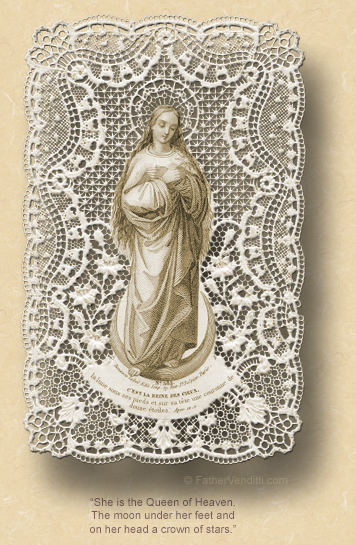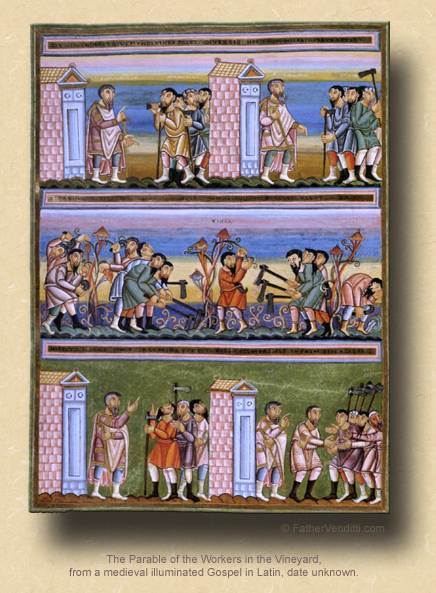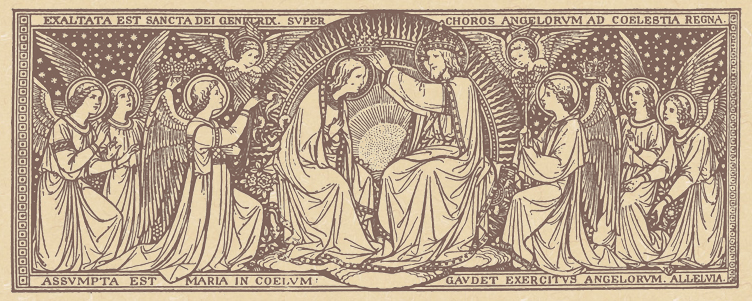The Gospel Is Not About Being Fair.
The Memorial of the Queenship of the Blessed Virgin Mary.
Lessons from the secondary feria, according to the ordinary form of the Roman Rite:
• Ezekiel 34: 1-11.
• Psalm 23.
• Matthew 20: 1-16.
|
…or, from the proper:
• Isaiah 9: 1-6.
• Psalm 113: 1-8.
• Luke 1: 26-38.
…or, any lessons from the common of the Blessed Virgin Mary.
|
The Second Class Feast of the Immaculate Heart of the Blessed Virgin Mary; and, the Commemoration of Saints Timothy, Hoppolytus & Symphorian, Martyrs.*
Lessons from the proper, according to the extraordinary form of the Roman Rite:
• Ecclesiasticus 24: 23-31.
• Psalm 12: 6.
• John 19: 25-27.
FatherVenditti.com
|
 11:53 AM 8/22/2018 — Those of you who may be familiar with the extraordinary form of the Roman Rite—or what some call the “Traditional Latin Mass”—might make the mistake of thinking that today’s memorial, the Queenship of the Blessed Virgin Mary, corresponds to the second class feast of the Immaculate Heart of Mary which occurs today on the traditional calendar, but it doesn’t. Today’s feast in the Traditional Latin Calendar, the Immaculate Heart of Mary, was transferred to the Saturday following the Feast of the Sacred Heart in the new calendar; today’s memorial in the modern calendar actually corresponds to the feast of the same name which was originally observed on May 31st. It was originally instituted by Pope Venerable Pius XII in 1954, and transferred to today’s date because today is the octave day of the Assumption of the Blessed Virgin Mary. 11:53 AM 8/22/2018 — Those of you who may be familiar with the extraordinary form of the Roman Rite—or what some call the “Traditional Latin Mass”—might make the mistake of thinking that today’s memorial, the Queenship of the Blessed Virgin Mary, corresponds to the second class feast of the Immaculate Heart of Mary which occurs today on the traditional calendar, but it doesn’t. Today’s feast in the Traditional Latin Calendar, the Immaculate Heart of Mary, was transferred to the Saturday following the Feast of the Sacred Heart in the new calendar; today’s memorial in the modern calendar actually corresponds to the feast of the same name which was originally observed on May 31st. It was originally instituted by Pope Venerable Pius XII in 1954, and transferred to today’s date because today is the octave day of the Assumption of the Blessed Virgin Mary.
We would not be fooling anyone—except ourselves—were we to pretend to agree with the behavior of the landowner in the parable our Lord tells us in the Gospel lesson. Those who worked no more than an hour get the same pay as those who worked all day. How is that fair? It isn't, because fairness is not a Christian virtue. The fact that most people think it is betrays the extent to which we've allowed our understanding of our own faith to be corrupted by purely social human ethics.
A lot of people make the mistake—or, rather the rationalization—of focusing exclusively on the landowner's punchline at the end of the parable: …an oculus tuus nequam est, quia ego bonus sum? The translation we have here in the Missal is boilerplate; both the Greek** and the Latin are much more colorful, and Msgr. Knox gives us an exact translation: “Must thou give me sour looks, because I am generous?” (Matt. 20: 15 Knox). And so, those uncomfortable with the actual point of our Lord's parable find an easy way to skirt the issue by using that last line to dilute our Lord's message to one of the necessity of being generous, which fits in with the program of the moderns of distilling the entire Gospel of Jesus Christ to a mere program of social justice: the whole point of Christianity is loving one another and being kind to one another and caring for the poor and the needy and running soup kitchens and blood drives and having our children save their nickles and dimes during Lent to feed the hungry and—according to their interpretation of today's Gospel lesson—promoting the ethics of justice and equality in society.
But the landowner in the parable is not the villain; he's the hero, in much the same way that the father in the Parable of the Prodigal Son is the hero in spite of the fact that his treatment of his elder son is also very unfair. A week ago today, when we looked at the Parable of the Unforgiving Servant who refused to forgive his fellow servant even after he, himself, had been forgiven of a much larger debt, we were confronted with the uncomfortable thought that what we so often refer to as the “Judeo-Christian” ethic has nothing to do with the Gospel of Jesus Christ. It is the paradox of our times: that what everyone thinks Christianity is all about simply cannot be found in the pages of the Holy Gospel.
We can try, as many do, to pull one or two lines from a Gospel lesson and use that to try and make the passage be about what we've already decided we want it to be about, as in the case of today's Gospel. Do that enough, and the Gospel is reduced to nothing more than a self-help book that could have been written by Doctor Phil; indeed, for many Christians—even for many Catholics—that's all it is: Jesus teaches us how to be nice to each other … period.
The point of our Lord's parable is not that it's important to be generous with our money; the point is that how God chooses to deal with us as individuals has no relationship to how he chooses to deal with someone else, which is none of our business.  Forgive me for pointing it out, but there is a Commandment about envy. We typically interpret it in terms of coveting our neighbor's material goods, but it applies to our neighbor's relationship to God as well. When we presume that God's treatment of us is unfair because we perceive that he's treated someone else differently, we've “Doctor Philled” the Gospel. We focus so much on our membership in the community of the Church, that we often forget that our relationship to Christ is a deeply personal one. The real punchline in today's Gospel lesson, if you want one, is the not the line “Are you envious because I am generous?” (20: 15 NABRE), but the line “My friend, I am not cheating you … Take what is yours and go” (vs. 13 & 14 NABRE). Forgive me for pointing it out, but there is a Commandment about envy. We typically interpret it in terms of coveting our neighbor's material goods, but it applies to our neighbor's relationship to God as well. When we presume that God's treatment of us is unfair because we perceive that he's treated someone else differently, we've “Doctor Philled” the Gospel. We focus so much on our membership in the community of the Church, that we often forget that our relationship to Christ is a deeply personal one. The real punchline in today's Gospel lesson, if you want one, is the not the line “Are you envious because I am generous?” (20: 15 NABRE), but the line “My friend, I am not cheating you … Take what is yours and go” (vs. 13 & 14 NABRE).
The longer I hear confessions, the more I am convinced that the greatest struggles we face in the interior life are not temptations of the flesh or distractions in our prayer or dark nights wherein our faith is tested; the greatest damage to interior peace and union with Christ come from comparing ourselves to others. That was the problem with the Pharisee in the Temple: “Lord, I thank Thee that I am not like this publican…” (cf. Luke 18: 11). What kind of prayer is that? What would have been worse is if the publican had said, “Lord, why can't you give to me what you've given to the Pharisee?” He can thank God that he didn't, since we know that the prayer of the Pharisee was not pleasing to God.
Let us pray that all of our prayers will be pleasing to God, and that we will cultivate a deeply personal relationship to our Lord, God and Savior, Jesus Christ, enlivened by our personal prayer, and nourished by our reception of the Most Holy Sacrament of the Altar.

* Though commemorated together, these three martyrs suffered in different persecutions: Timothy under Maximian, Bishop Hippolytus under Alexander, and the youth Symphorian under Aurelian. The commemoration is made by an additional Collect, Secret and Postcommunion added to those of the feast.
** “…ἢ ὁ ὀφθαλμός σου πονηρός ἐστιν ὅτι ἐγὼ ἀγαθός εἰμι….”
|

